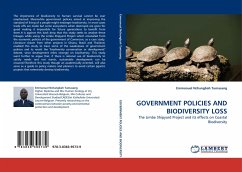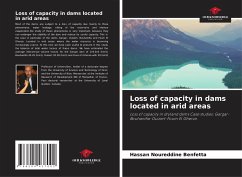
GOVERNMENT POLICIES AND BIODIVERSITY LOSS
The Limbe Shipyard Project and its effects on Coastal Biodiversity
Versandkostenfrei!
Versandfertig in 6-10 Tagen
52,99 €
inkl. MwSt.

PAYBACK Punkte
26 °P sammeln!
The importance of biodiversity to human survival cannot be over emphasised. Meanwhile government policies aimed at improving the standard of living of a people might endanger biodiversity. In most cases trade offs are made but some ecosystems when destroyed are gone for good making it impossible for future generations to benefit from them.It is against this back drop that this study seeks to analyse these linkages while using the Limbe Shipyard Project which emanated from the economic policies of the government of Cameroon, as a case study. Literature drawn from other projects in Ghana, Brazil...
The importance of biodiversity to human survival cannot be over emphasised. Meanwhile government policies aimed at improving the standard of living of a people might endanger biodiversity. In most cases trade offs are made but some ecosystems when destroyed are gone for good making it impossible for future generations to benefit from them.It is against this back drop that this study seeks to analyse these linkages while using the Limbe Shipyard Project which emanated from the economic policies of the government of Cameroon, as a case study. Literature drawn from other projects in Ghana, Brazil and Thailand, enabled this study to trace some of the weaknesses of government policies and to revisit the "biodiversity conservation or development" debate, since development relies strongly on biodiversity. This study went further to argue that, if there is rational use of biodiversity to satisfy needs and not wants, sustainable development can be ensured.Therefore this study though an academically oriented, will also serve as a guide to policy makers and planners to avoid certain jigantic projects that extensively destroy biodiversity.












